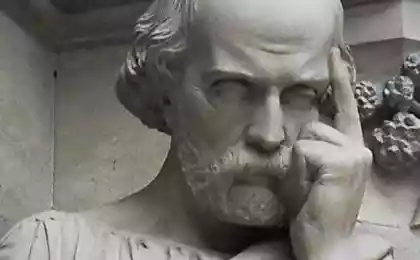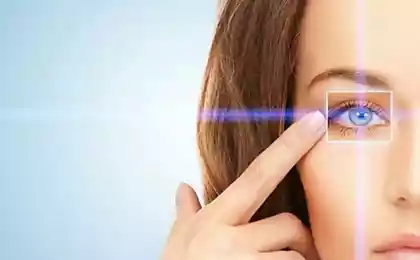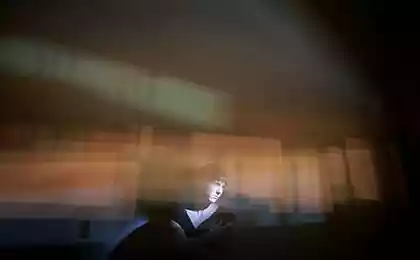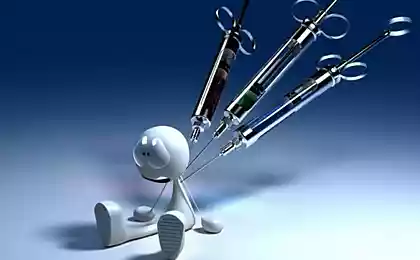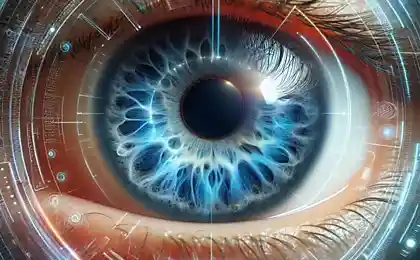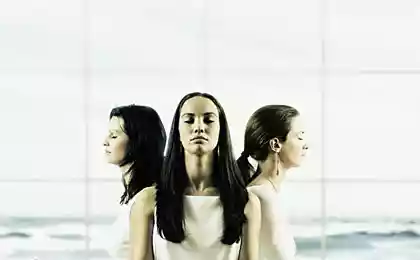540
Psychosomatic diseases for example poor vision
From the position of optometrist poor vision can be due to any of three reasons: it is heredity, or injury, or harmful habits (to read in the dark, watching TV too close or for too long, etc.).
But from the perspective of a psychologist-psychosomatics his first guess about the cause of the disease may indicate an unconscious unwillingness of the patient something to see, something to notice. Optometrist at the reception asked: "how Many of you, my friend, are reading, and what is the vision your parents?", a psychologist might ask: "Think and tell me what and who you really don't want to see, but are forced to do it!?"
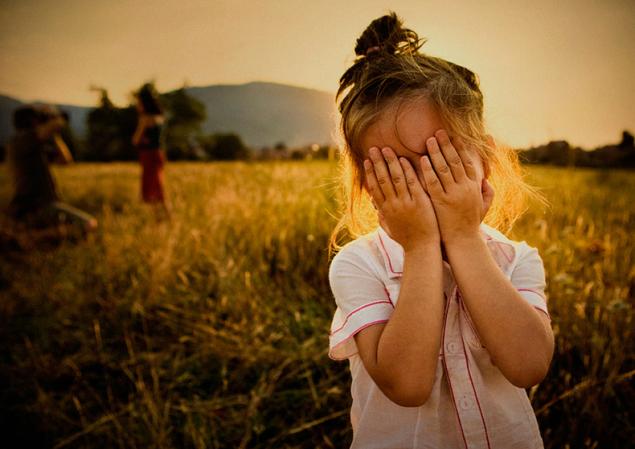
At such statement of a question it is easy to see that all our explanations of the causes of the disease have a right to exist – and at the same time.
And poor vision would be – as a direct result of repressed desire not to see something (or) someone. And poor vision would be – as a signal (a metaphor, a message) that want and need something and someone not to see became unbearable, and satisfy her, to avoid malicious stimulus, there is no way. Losing sight of the person behind it gets "secondary gain", that is, becomes able to see closely what he does not want to see.
And he can not dispose of life so that the stimulus has disappeared from his field of vision, so the weakening of my vision, it eases the psychological experience (compensation). And forced to see what he does not want to see, a person creates a contradiction between the parts of their experience (good vision on the one hand and "bad" psychological vision on the other), and his good vision, is equated to the "psychological vision" (sync). And finally, it is obvious that the man thus creates in his mind tough program "bad" visual experience (it manifests itself in the words: "see you don't want", "get out of my face", "my eyes have not seen you", "don't let me eyes" and "see you sick," and so on and so forth).
Of course, that reluctance to see someone – is not the only cause of poor vision, and I for example referred to it. With equal "success" eyesight can deteriorate from an equally strong desire to see anyone. Not did you, by the way, the attention to the fact that the youth vision deteriorates, usually with minus (myopia or nearsightedness), and the elderly with a plus sign (hyperopia)!?
Even on this occasion there was one interesting theory: the fact that our past and future independent of our vision. We don't need sight in itself to see the desired future, and we don't need vision to scroll in the head "film of the past." We use so-called "inner vision", or we are able visually to recall seen pictures, or to construct a new picture of the items previously seen. Our eyes can be closed.
Older people have a lot of the past, all their past experience dominates the present and future. And young people's "perspectives" is "still ahead", is "the future".
In this case, we can assume that the frequent recourse to images of the future leads us to myopia, and frequent recourse to the past, to hyperopia. I'm not going to convince You that this is so, it's just a theory.
But at least it gives me an answer how such an amazing vision in people with age varies from minus to plus, with myopia to hyperopia. It may also be noted that people in the present time, all the time "here and now" have very little chance to damage the eyesight, because all the time I use only physiological vision, and very little vision, so to say, psychological.
Another theory deteriorating vision remember: it is associated with the establishment of compulsory physical limitations on view distance. Such boundaries are the walls of houses, fences, books, computer screen and TV, etc.
Before eyes all time there is an obstacle on which you focus view, and this distance is enforced, does not depend on you that houses are bigger, the streets more closely, what you need to read more and more that look all the time like in a cage, restricted physically impenetrable barriers. This problem primarily relates to major cities, cities, like new York or Moscow, and the higher their density, the more closely compacted life, the more people vision deteriorates.
But indirectly it can attest to the fact that on opening large areas without any obstacles (the Ferris wheel, the top floor of a multistory building) there is some kind of strange "visual euphoria". Perhaps our eyes at this moment feel like the escaped prisoner who enjoys freedom.
Finally, yet another theory that visual disturbances can be associated with the type and style of thinking. The fact that in addition to our eyes, we have another kind of "eyes" that are able to see at any distance, which can overcome any obstacles that equally well can see and night and day. These "eyes" – our mind. The mind is able to simulate visual sensations without any connection with the fact that at this point in time see with our own eyes. And it is interesting to note that there are many idiomatic expressions that clearly indicate this type of "vision": "what a visionary", "behold the root", "can not see beyond their nose" and so forth.
However, so far not found a clear answer to the question of how one relates to others. For example, we can say that the person who reads a lot, has a lot of chances to weaken your eyesight. But you could say something completely different: a man who reads a lot, all the time generates visual picture in my head, which is not the reality. Or, in other words, it uses physical sight to see the psychological "look" in his eyes, in fact, become a vestige touch psychological view.
The true visual function all the time is inhibited, and we are forced to do something (e.g. watch a movie) to fix it (as, for example, we go to the gym to run on the treadmill and pedal, to somehow keep the resource muscle activity).
But it's all of the above, as comrade hamlet, "words, words, words". As you can see, the possible causes and consequences are many – and each of them probably has a "hint", the highlight. published
P. S. And remember, only by changing their consumption — together we change the world! ©
Join us in Facebook , Vkontakte, Odnoklassniki
Source: www.yastr.com/ZDOROVIE_BEZ_LEKARSTV/psihosomatika/
But from the perspective of a psychologist-psychosomatics his first guess about the cause of the disease may indicate an unconscious unwillingness of the patient something to see, something to notice. Optometrist at the reception asked: "how Many of you, my friend, are reading, and what is the vision your parents?", a psychologist might ask: "Think and tell me what and who you really don't want to see, but are forced to do it!?"

At such statement of a question it is easy to see that all our explanations of the causes of the disease have a right to exist – and at the same time.
And poor vision would be – as a direct result of repressed desire not to see something (or) someone. And poor vision would be – as a signal (a metaphor, a message) that want and need something and someone not to see became unbearable, and satisfy her, to avoid malicious stimulus, there is no way. Losing sight of the person behind it gets "secondary gain", that is, becomes able to see closely what he does not want to see.
And he can not dispose of life so that the stimulus has disappeared from his field of vision, so the weakening of my vision, it eases the psychological experience (compensation). And forced to see what he does not want to see, a person creates a contradiction between the parts of their experience (good vision on the one hand and "bad" psychological vision on the other), and his good vision, is equated to the "psychological vision" (sync). And finally, it is obvious that the man thus creates in his mind tough program "bad" visual experience (it manifests itself in the words: "see you don't want", "get out of my face", "my eyes have not seen you", "don't let me eyes" and "see you sick," and so on and so forth).
Of course, that reluctance to see someone – is not the only cause of poor vision, and I for example referred to it. With equal "success" eyesight can deteriorate from an equally strong desire to see anyone. Not did you, by the way, the attention to the fact that the youth vision deteriorates, usually with minus (myopia or nearsightedness), and the elderly with a plus sign (hyperopia)!?
Even on this occasion there was one interesting theory: the fact that our past and future independent of our vision. We don't need sight in itself to see the desired future, and we don't need vision to scroll in the head "film of the past." We use so-called "inner vision", or we are able visually to recall seen pictures, or to construct a new picture of the items previously seen. Our eyes can be closed.
Older people have a lot of the past, all their past experience dominates the present and future. And young people's "perspectives" is "still ahead", is "the future".
In this case, we can assume that the frequent recourse to images of the future leads us to myopia, and frequent recourse to the past, to hyperopia. I'm not going to convince You that this is so, it's just a theory.
But at least it gives me an answer how such an amazing vision in people with age varies from minus to plus, with myopia to hyperopia. It may also be noted that people in the present time, all the time "here and now" have very little chance to damage the eyesight, because all the time I use only physiological vision, and very little vision, so to say, psychological.
Another theory deteriorating vision remember: it is associated with the establishment of compulsory physical limitations on view distance. Such boundaries are the walls of houses, fences, books, computer screen and TV, etc.
Before eyes all time there is an obstacle on which you focus view, and this distance is enforced, does not depend on you that houses are bigger, the streets more closely, what you need to read more and more that look all the time like in a cage, restricted physically impenetrable barriers. This problem primarily relates to major cities, cities, like new York or Moscow, and the higher their density, the more closely compacted life, the more people vision deteriorates.
But indirectly it can attest to the fact that on opening large areas without any obstacles (the Ferris wheel, the top floor of a multistory building) there is some kind of strange "visual euphoria". Perhaps our eyes at this moment feel like the escaped prisoner who enjoys freedom.
Finally, yet another theory that visual disturbances can be associated with the type and style of thinking. The fact that in addition to our eyes, we have another kind of "eyes" that are able to see at any distance, which can overcome any obstacles that equally well can see and night and day. These "eyes" – our mind. The mind is able to simulate visual sensations without any connection with the fact that at this point in time see with our own eyes. And it is interesting to note that there are many idiomatic expressions that clearly indicate this type of "vision": "what a visionary", "behold the root", "can not see beyond their nose" and so forth.
However, so far not found a clear answer to the question of how one relates to others. For example, we can say that the person who reads a lot, has a lot of chances to weaken your eyesight. But you could say something completely different: a man who reads a lot, all the time generates visual picture in my head, which is not the reality. Or, in other words, it uses physical sight to see the psychological "look" in his eyes, in fact, become a vestige touch psychological view.
The true visual function all the time is inhibited, and we are forced to do something (e.g. watch a movie) to fix it (as, for example, we go to the gym to run on the treadmill and pedal, to somehow keep the resource muscle activity).
But it's all of the above, as comrade hamlet, "words, words, words". As you can see, the possible causes and consequences are many – and each of them probably has a "hint", the highlight. published
P. S. And remember, only by changing their consumption — together we change the world! ©
Join us in Facebook , Vkontakte, Odnoklassniki
Source: www.yastr.com/ZDOROVIE_BEZ_LEKARSTV/psihosomatika/
Photographers worked 32 days to shoot this tree in its entirety
How to reduce cholesterol: 14 natural juices and cocktails

